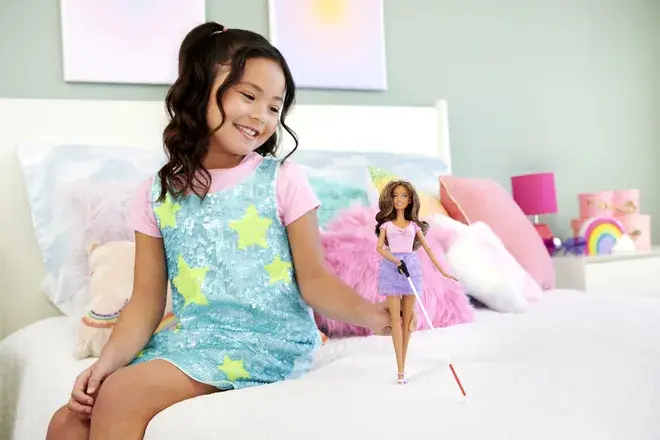Barbie Celebrates Inclusivity (2024)
- John-Michael Scurio

- Jul 27, 2024
- 3 min read
In a groundbreaking move towards inclusivity, Mattel has recently unveiled two revolutionary additions to its Barbie lineup: the first-ever blind Barbie and the first Black Barbie with Down syndrome. These new dolls are part of Barbie's 2024 Fashionistas line, which aims to represent a wide array of skin tones, eye colors, hair textures, body types, and disabilities, reinforcing the brand's commitment to diversity and inclusion (VI News) (KIRO7).
Earlier additions to Barbie's Fashionista collection have featured a doll with hearing aids, dolls accompanied by a wheelchair and ramp, and Barbie and Ken dolls with the skin condition vitiligo.
The Journey Towards Inclusive Representation
Barbie has long been a cultural icon, shaping children's imaginations and aspirations since its inception. However, the brand has not been without its criticisms, particularly concerning its lack of diversity.
In response, Mattel has progressively introduced dolls that better reflect the world around us. The latest additions of a blind Barbie and a Black Barbie with Down syndrome mark significant milestones in this ongoing journey.
The creation of these dolls was a collaborative effort with nonprofit organizations that advocate for people with vision impairment and Down syndrome. This partnership ensured that the dolls were not only inclusive but also accurately represented the communities they portray (VI News).

Detailed and Thoughtful Design
Every aspect of these dolls has been meticulously designed to ensure authenticity and respect. For the blind Barbie, details such as the doll's posture and accessories were crafted to reflect the experiences of individuals with vision impairments. The Black Barbie with Down syndrome features a new face and body sculpt, with characteristics such as a rounder face, almond-shaped eyes, and a single line on the palms, which are often associated with Down syndrome (Barbie Media).
The fashion and accessories of these dolls also carry significant meaning. The Black Barbie with Down syndrome dons a dress adorned with butterflies and the colors blue and yellow, symbols often associated with Down syndrome awareness. Additionally, the doll wears pink ankle-foot orthotics (AFOs), which are used by some children with Down syndrome for support (Barbie Media).

Impact on Children and Society
The introduction of these inclusive dolls is more than just a commercial endeavor; it is a profound step towards fostering empathy, understanding, and acceptance among children. By playing with dolls that reflect diverse experiences, children can learn to appreciate differences and develop a more inclusive worldview. This early exposure to diversity can help counter social stigmas and promote a sense of belonging for all children.
Lisa McKnight, Executive Vice President and Global Head of Barbie and Dolls at Mattel, emphasized the importance of representation in play. She stated that enabling children to see themselves in Barbie and encouraging them to play with dolls that do not look like themselves can teach understanding and build empathy, ultimately leading to a more accepting world(KIRO7).
The Future of Inclusive Play
This introduction of inclusive Barbie dolls marks a significant paradigm shift in the toy industry. Historically, toys have often reflected a narrow segment of society, predominantly featuring characters that adhered to certain physical and cultural norms. However, the landscape of toy manufacturing is evolving, driven by a growing recognition of the importance of diversity and representation. Mattel's latest initiative with Barbie exemplifies this transformation, showcasing a commitment to inclusivity that is both socially impactful and commercially savvy.
As Barbie continues to expand its diverse and inclusive lineup, the brand sets a precedent for the toy industry. The introduction of these new dolls demonstrates a commitment to representing the myriad experiences and identities that make up our world. By doing so, Barbie not only remains relevant but also becomes a powerful tool for social change.
These efforts are celebrated by communities and organizations dedicated to advocating for people with disabilities. Kandi Pickard, President and CEO of the National Down Syndrome Society, highlighted the significance of these dolls, stating that they serve as a reminder of the power of representation and mark a significant step forward for inclusion (Barbie Media).
The new inclusive Barbie dolls are a testament to Mattel's dedication to diversity and inclusion. By introducing dolls that represent a broader spectrum of humanity, Barbie is helping to shape a more inclusive world, one child at a time. These dolls not only provide children with the opportunity to see themselves reflected in their toys but also encourage them to embrace and celebrate differences, fostering a generation that values empathy and acceptance and feels represented and valued.🤝




